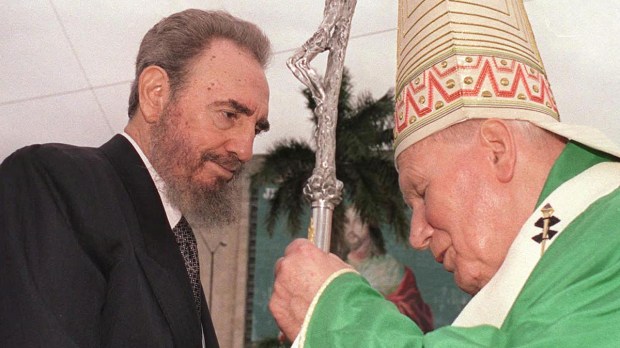From How the Grinch Stole Christmas to Miracle on 34th Street, there is no shortage of movies and media about “saving” Christmas. It’s a fairly standard trope; something happens socially or environmentally to jeopardize the celebration and characters need to find a way to restore the holiday before it’s too late. There’s a better story – a true story about saving Christmas – and the hero of the day was Pope St. John Paul II.
Christmas banned
The story begins in 1959, when Fidel Castro rose to power as Prime Minister of Cuba, marking the rise of communism in the island nation. ChurchPop explains that the communist regime spent the following decade spreading its tendrils to every facet of society, including state-mandated atheism. By 1965, the country was fully governed by the communist party, and by 1969 the celebration of Christmas was banned.
This was no flash in the pan prohibition, as we experienced in the pandemic of 2020, but a lasting political policy. Generations of children grew up with no inkling of what the Christmas season meant, let alone a visit from the Three Kings, as for nearly 30 years the ban on Christmas was upheld.
Castro wouldn’t even consider restoring the holiday until 1998, when JPII was preparing to make the historic first papal visit to Cuba. Vatican Insider interviewed Joaquín Navarro-Valls, John Paul II’s spokesman, who recalled his conversations with Castro as the papal visit approached. He described a six-hour phone call in which Castro expressed a fascination with the pope through continuous questions about Karol Wojtyla, the man.
“I sensed he wanted to delve deeper.” Navarro-Valls recalled, “I said to him: ‘Mr. President, I envy you.’ ‘Why?’ ‘Because the pope prays for you every day, he prays that a man of your education may find the way of the Lord again.’ For once, the Cuban president was silent.”
Negotiations
Once the two had built a rapport, Navarro-Valls slowly broached the topic by suggesting that Cuba needed a way to surprise the world. When Castro agreed, that’s when he dropped the bomb, asking if Christmas could be celebrated as a national Cuban holiday for the first time since the revolution began. Castro was hesitant at first:
“He said it would be very difficult as Christmas fell right in the middle of the sugar cane harvesting season. To which I responded: ‘But the Holy Father would like to be able to publicly thank you for this gesture once he lands in Havana.’”
This was quite the offer. Public recognition from one of the world leaders most responsible for bringing down the Berlin Wall, a symbol of communism, was nothing to scoff at. Following another long discussion with Navarro-Valls, Castro finally relented and removed the ban on Christmas.
Castro did, however, warn the Vatican spokesman that the ban could be reinstituted the following year. Navarro-Valls, thrilled to have brought Christmas back to Cuba after nearly three decades, didn’t overplay his hand:
“All I said was: ‘Great, the pope will be grateful to you for this. And as for next year, we’ll see.’ As we know, to this day, Christmas is still celebrated as a public holiday in Cuba.”
Papal visit
JPII’s papal visit to Cuba would go on to be a rousing success, drawing thousands to hear the pope speak. Castro too had an encounter with the sainted pope, behind closed doors. While we are not privy to the conversation, the two reportedly wore smiles as they left. When JPII was preparing to leave, Castro expressed how touched he was by the visit, saying:
“Thank you for everything you said, even for those words I may not have liked,” Castro told St. John Paul II.
Read the full interview at Vatican Insider.

